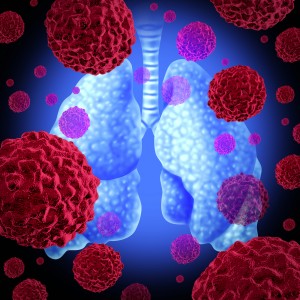 A phase II clinical trial for patients with oligometastatic lung cancer will test the new immunotherapy drug pembrolizumab. This drug acts specifically on T cells and blocks the programmed death receptor (PD-1) pathway, which promotes tumor-mediated immunosuppression by inhibiting T cell activation. Thus, pembrolizumab-mediated blocking of PD-1 allows the immune system to adequately fight cancer cells.
A phase II clinical trial for patients with oligometastatic lung cancer will test the new immunotherapy drug pembrolizumab. This drug acts specifically on T cells and blocks the programmed death receptor (PD-1) pathway, which promotes tumor-mediated immunosuppression by inhibiting T cell activation. Thus, pembrolizumab-mediated blocking of PD-1 allows the immune system to adequately fight cancer cells.
A research team led by Joshua Bauml, MD, assistant professor of Hematology/Oncology in Penn’s Abramson Cancer Center, will evaluate whether pembrolizumab, when administered to oligometastatic non-small cell lung cancer (NSCLC) patients, can delay disease progression and improve patients’ survival. Oligometastatic disease is characterized by a limited metastatic burden in a confined area; however, while these patients are considered free of active disease, and have a better prognosis than advanced lung cancer patients (overall survival for oligometastatic patients is 20 months, while patients with metastatic disease can reach a maximum 12 months) they still exhibit a high risk for disease recurrence. In fact, after responding positively to initial treatments of chemo and radiotherapy, these patients ultimately develop metastatic disease that eventually results in death.
Now, following results of success of pembrolizumab treated melanoma patients (which led to an FDA approval), the team will study its effects on patients with oligometastatic disease. The trial enrolled 42 patients who have finished treatment for all tumor sites by surgery, chemotherapy or radiation. Patients who finished their treatments will receive pembrolizumab for a minimum of six months, with administration every three weeks. The trial will be ongoing for 3 years and has established progression free survival and drug toxicity as its primary outcomes. Additionally, parameters will include patient overall survival and quality of life.
Doctor Bauml commented in a press release, “NSCLC has historically been resistant to most immunotherapies, but PD-1 directed therapies have promise, yielding some impressive clinical responses in patients. Use of the drug in this group could be ideal since the overall burden of disease is low — they have been deemed nearly cancer-free — and the patients are generally fit and more able to tolerate the therapy. We want to find out if we may be able to utilize this ‘window of opportunity’ to rev up the immune system and keep metastatic cancer at bay.”


